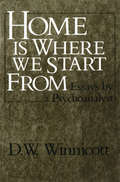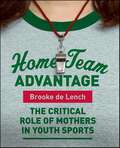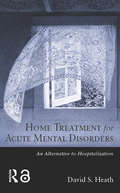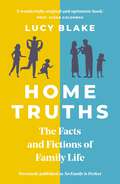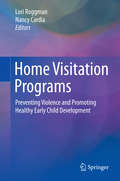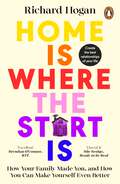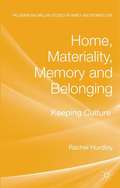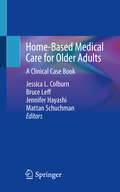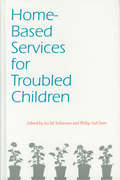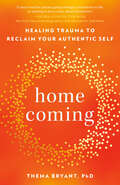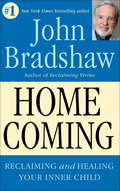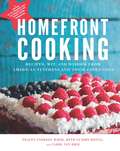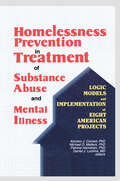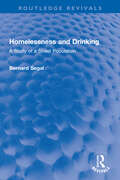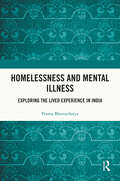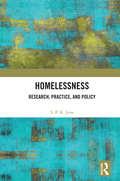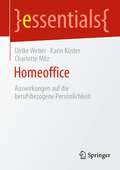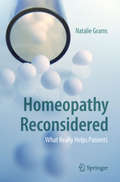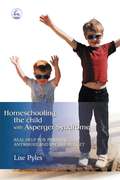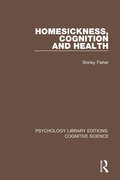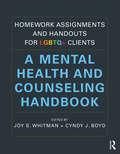- Table View
- List View
Home Home
by Lisa Allen-AgostiniFans of Monday's Not Coming and Girl in Pieces will love this award-winning novel about a girl on the verge of losing herself and the unlikely journey to recovery after she is removed from anything and everyone she knows to be home.Moving from Trinidad to Canada wasn't her idea. But after being hospitalized for depression, her mother sees it as the only option. Now, living with an estranged aunt she barely remembers and dealing with her "troubles" in a foreign country, she feels more lost than ever.Everything in Canada is cold and confusing. No one says hello, no one walks anywhere, and bus trips are never-ending and loud. She just wants to be home home, in Trinidad, where her only friend is going to school and Sunday church service like she used to do.But this new home also brings unexpected surprises: the chance at a family that loves unconditionally, the possibility of new friends, and the promise of a hopeful future. Though she doesn't see it yet, Canada is a place where she can feel at home--if she can only find the courage to be honest with herself."Allen-Agostini uses frank yet gentle prose...[in this] hopeful story about finding one's place and the sometimes-difficult journey to self-acceptance."-Kirkus Reviews, Starred review"An accessible look at teen anxiety and depression...[Home Home] shines in its depictions of the physical and emotional aspects of anxiety and depression...[and] teens of color coping with mental illness will find common cause with this Trini girl's journey toward self-actualization and healing."--Booklist"Allen-Agostini depicts the culture of her homeland with honesty and enlightening details,...delivering important messages about acceptance and mental illness."-SLJ
Home Is Where We Start From: Essays by a Psychoanalyst
by D. W. WinnicottOne of the most gifted and creative psychoanalysts of his generation, D. W. Winnicott made lasting contributions to our understanding of the minds of children. His ideas have influenced the diverse psychoanalytic schools of Anna Freud, Melanie Klein, and Hans Kohut. But his reach extends far beyond professional circles: his talks to general audiences over the years won him enormous numbers of followers among parents and teachers who have found his observations rich in penetrating insight. This collection brings together many of Winnicott's most important pieces, including previously unpublished talks and several essays from books and journals now difficult to obtain. They range widely in topic—from "The Concept of a Healthy Individual" and "The Value of Depression" to "Delinquency as a Sign of Hope"—and elucidate some of Winnicott's seminal ideas, such as the "transitional object" and the concept of false self. All convey Winnicott's vision of the ways in which the developing self interacts with the family and the larger society.
Home Team Advantage: The Critical Role of Mothers in Youth Sports
by Brooke de LenchOver the past decade, the stakes in youth sports have reached startling heights; the pressure to win often eclipses the desire to have fun. Sports injuries have increased tenfold; aggression on and off the field—between kids, parents, and coaches—is at a fever pitch; and drug and alcohol use among young athletes is on the rise. While there are plenty of books that help the best-intentioned parent, most of them are written by men, for men. They do not address concerns specific to mothers, nor empower them to confidently step onto the out-of-control playground to assume whatever role they choose—spectator, advocate, administrator, coach, fund-raiser, or team mom.Home Team Advantage is an essential resource manual that will inspire women to confidently tackle some of the issues preventing their kids from enjoying sports. Brooke de Lench authoritatively covers issues ranging from ensuring playing time and confronting out-of-control coaches to countering the "winning at all costs" mentality. Packed with real-life anecdotes and information from experts, Home Team Advantage provides constructive, practical, and forward-thinking advice to help mothers understand the critical role they can play in putting the words fun, game, and play back into youth sports.
Home Treatment for Acute Mental Disorders: An Alternative to Hospitalization
by David S. HeathIn the U.S., when a patient is in need of rigorous psychiatric care, the first step is hospitalization. However, elsewhere in the world, psychiatric home treatment is proposed as an alternative. Model programs in Canada and the United Kingdom are publicly administered by community health agencies or teaching hospitals. Home Treatment for Acute Mental Disorders provides a review of the literature on home care and describes working programs around the world. This timely volume reviews treatment plans for different disorders with case illustrations, explains the administration of a PHC program and offers guidelines to case workers. It will be of interest to psychiatrists and policy makers working on the issue of patient hospitalization.
Home Truths: The Facts and Fictions of Family Life
by Lucy BlakePreviously published as No Family is Perfect.'Provides a fresh context for exploring issues that engage us throughout our lives ... It will change how we think and write about families' Terri Apter, author of Difficult Mothers and The Sister KnotWhat makes a good parent?How can sibling relationships survive to adulthood?Should familial love really be unconditional?Dr Lucy Blake looks at how the expectations we have affect and hinder our interactions with family members. Drawing on interviews with hundreds of family members – of all backgrounds – she explores the unrealistic ideas many of us have. Exposing the truth of what a family really is, Blake explores how to better understand and appreciate our loved ones, whether we choose to do so from up close or from a distance.Home Truths is a fascinating examination of the messy and beautiful reality of family life.'Blake examines the many aspects of family life and addresses the many ways that family relationships can be strained ... This book will be helpful to anyone interested in learning more about their own families' Dr Joshua Coleman, Council on Contemporary Families
Home Visitation Programs
by Lori Roggman Nancy CardiaThis timely resource analyzes home visits as a primary intervention for at-risk families with infants and young children and details innovative programs for home service delivery. Focusing on family violence, mental illness and alcohol and substance abuse as major challenges to child development, the book presents practical strategies for home visitors to address and prevent problems while fostering an improved environment for raising children. Contributors offer a realistic framework for planning, developing, and training an effective home visitation workforce and tailoring interventions to fit individual family dynamics. And the book's international focus provides a variety of perspectives on evidence-based programs that support families raising children in distressed neighborhoods. Among the featured topics: Home visitation as a primary prevention tool for violence. Developmental parenting home visiting to prevent violence. Supporting the paraprofessional home visitor. Engagement and retention in home visiting child abuse prevention programs. Addressing psychosocial risk factors among families in home visiting programs. Home visitation programs in the United States, Latin America, and the Caribbean. Home Visitation Programs: Preventing Violence and Promoting Healthy Early Child Development is an essential resource for researchers, graduate students and professionals in child and school psychology, social work, educational policy, family advocacy and public health.
Home in the World: A Memoir
by Amartya SenFrom Nobel Prize winner Amartya Sen, a long-awaited memoir about home, belonging, inequality, and identity, recounting a singular life devoted to betterment of humanity. The Nobel laureate Amartya Sen is one of a handful of people who may truly be called “a global intellectual” (Financial Times). A towering figure in the field of economics, Sen is perhaps best known for his work on poverty and famine, as inspired by events in his boyhood home of West Bengal, India. But Sen has, in fact, called many places “home,” including Dhaka, in modern Bangladesh; Kolkata, where he first studied economics; and Trinity College, Cambridge, where he engaged with the greatest minds of his generation. In Home in the World, these “homes” collectively form an unparalleled and profoundly truthful vision of twentieth- and twenty-first-century life. Here Sen, “one of the most distinguished minds of our time” (New York Review of Books), interweaves scenes from his remarkable life with candid philosophical reflections on economics, welfare, and social justice, demonstrating how his experiences—in Asia, Europe, and later America—vitally informed his work. In exquisite prose, Sen evokes his childhood travels on the rivers of Bengal, as well as the “quiet beauty” of Dhaka. The Mandalay of Orwell and Kipling is recast as a flourishing cultural center with pagodas, palaces, and bazaars, “always humming with intriguing activities.” With characteristic moral clarity and compassion, Sen reflects on the cataclysmic events that soon tore his world asunder, from the Bengal famine of 1943 to the struggle for Indian independence against colonial tyranny—and the outbreak of political violence that accompanied the end of British rule. Witnessing these lacerating tragedies only amplified Sen’s sense of social purpose. He went on to study famine and inequality, wholly reconstructing theories of social choice and development. In 1998, he was awarded the Nobel Prize for his contributions to welfare economics, which included a fuller understanding of poverty as the deprivation of human capability. Still Sen, a tireless champion of the dispossessed, remains an activist, working now as ever to empower vulnerable minorities and break down walls among warring ethnic groups. As much a book of penetrating ideas as of people and places, Home in the World is the ultimate “portrait of a citizen of the world” (Spectator), telling an extraordinary story of human empathy across distance and time, and above all, of being at home in the world.
Home is Where the Start Is: How Your Family Made You, and How You Can Make Yourself Even Better
by Richard HoganIThe bestselling guide for understanding how your family made you, and how you can make yourself even better. 'Excellent' - Brendan O'Connor, RTÉ Radio One'I loved it' - Síle Seoige, Ready to Be Real * * *Our early years at home are when we lay down the blueprint for being a partner, parent, sibling, friend, colleague, neighbour, and even a citizen. Home is where we become who we are.Even the best of childhoods is imperfect. And if there were difficulties - whether due to simple personality clashes, or issues such as authoritarian parenting, family break-up, illness, loss or addiction - it may be an ongoing struggle to manage our moods and emotions, though we may have no idea why. Psychotherapist Richard Hogan has seen it all when it comes to how the early years shape us - and he knows we can work on ourselves to rewrite the blueprint. In this book he draws on extensive research and thousands of conversations in the therapy room to explain how.Packed full of eye-opening and liberating ideas, fascinating case studies and practical tools, Home is Where the Start Is also includes a remarkable account of Richard's own challenges as a child and teenager. He knows exactly what it's like to face the past squarely, grapple with the legacy of childhood unhappiness and work on creating a better future.Home is Where the Start Is will help you become the best version of yourself you can be. And it is an invaluable source of advice for parents to give your child the best possible start.* * *'Filled with articulate and fundamentally encouraging advice' - Sunday Independent 'A book of hope' - RSVP 'An essential guide for anyone who wants to break free from the cycles of family dysfunction' - Irish Examiner'Refreshing . . . for everyone who's interested in simply living better, with a little more stress and a lot more joy' - Anglo-Celt
Home, Materiality, Memory and Belonging: Keeping Culture
by Rachel HurdleyAssembling Mass Observation Archive material with historiographies of family, house and nation from ancient-Greece to present-day Europe, China and America, this book contributes to current debates on identity, belonging, memory and material culture by exploring how power works in the small spaces of home.
Home-Based Medical Care for Older Adults: A Clinical Case Book
by Bruce Leff Jessica L. Colburn Jennifer Hayashi Mattan SchuchmanAs the population of older adults in the U.S. continues to grow, medical house calls are increasingly part of a system of comprehensive home-based care for patients who have difficulty accessing office-.based care. Clinicians who have been trained mostly in office and hospital settings must adapt their usual approaches to accommodate a wide range of environmental, social, and physical circumstances that impact home-limited patients. Ideally, a comprehensive team of clinicians proficient in multiple domains of functional, social, and medical care can work together to address potential gaps in any one clinician’s expertise. Unfortunately, such teams are still rare. This book aims to equip individual clinicians with the interdisciplinary knowledge, skills, and perspective they need to provide the best care possible with limited formal interdisciplinary support. This book offers 20 patient cases drawn from the collective experience of experts in home-based medical care from highly respected academic and clinical programs across the United States. Each case demonstrates a scenario that is frequently encountered and/or very important in home-based medical care practice. Each scenario frequently proves to be challenging for many professionals because it requires an approach or leverages aspects of care delivery that most are not trained in. Additionally, each scenario reflects an approach to care that is enhanced by interdisciplinary input. Finally, each case lends itself to a practical problem-solving approach that could be accomplished by most home-based medical care providers, even in the absence of an interdisciplinary team. Written by interdisciplinary experts in geriatric home-based care, this book serves as both an educational tool for learners in all related disciplines as well as a quick reference for experienced clinicians looking to augment their existing house call “toolbox.”
Home-Based Services for Troubled Children
by Ira M. Schwartz Dr Philip AuClaireThere is mounting interest in services to strengthen families and, if possible, to keep them together, preventing unnecessary and costly out-of-home placements. Unfortunately, although these programs are proliferating throughout the country, many are developing without the benefit of existing historical, conceptual, and scholarly data, information needed to make sound fiscal policy and programmatic decisions. This book fills this critical void, with a systematic examination of home-based services for abused, neglected, delinquent, and emotionally disturbed children and their families. With the most authoritative research on the topic to date, this book will be of interest to practitioners, policymakers, and child advocates.
Homecoming: Overcome Fear and Trauma to Reclaim Your Whole, Authentic Self
by Thema BryantA road map for dismantling the fear and shame that keep you from living a free and authentic life.In the aftermath of stress, disappointment, and trauma, people often fall into survival mode, even while a part of them longs for more. Juggling multiple demands and responsibilities keeps them busy, but not healed. As a survivor of sexual assault, racism, and evacuation from a civil war in Liberia, Dr. Thema Bryant knows intimately the work involved in healing. Having made the journey herself, in addition to guiding others as a clinical psychologist and ordained minister, Dr. Thema shows you how to reconnect with your authentic self and reclaim your time, your voice, your life. Signs of disconnection from self can take many forms, including people-pleasing, depression, anxiety, and resentment. Healing starts with recognizing and expressing emotions in an honest way and reconnecting with the neglected parts of yourself, but it can&’t be done in a vacuum. Dr. Thema gives you the tools to meaningfully connect with your larger community, even if you face racism and sexism, heartbreak, grief, and trauma. Rather than shrinking in the face of life&’s difficulties, you will discover in Homecoming the therapeutic approaches and spiritual practices to live a more expansive life characterized by empowerment, healthier relationships, gratitude, and a deeper sense of purpose.
Homecoming: Reclaiming and Healing Your Inner Child
by John BradshawAre you outwardly successful but inwardly do you feel like a big kid? Do you aspire to be a loving parent but all too often "lose it" in hurtful ways? Do you crave intimacy but sometimes wonder if it's worth the struggle? Or are you plagued by constant vague feelings of anxiety or depression? If any of this sounds familiar, you may be experiencing the hidden but damaging effects of a painful childhood--carrying within you a "wounded inner child" that is crying out for attention and healing.In this powerful book, John Bradshaw shows how we can learn to nurture that inner child, in essence offering ourselves the good parenting we needed and longed for. Through a step-by-step process of exploring the unfinished business of each developmental stage, we can break away from destructive family rules and roles and free ourselves to live responsibly in the present. Then, says Bradshaw, the healed inner child becomes a source of vitality, enabling us to find new joy and energy in living.Homecoming includes a wealth of unique case histories and interactive techniques, including questionnaires, letter-writing to the inner child, guided meditations, and affirmations. Pioneering when introduced, these classic therapies are now being validated by new discoveries in attachment research and neuroscience. No one has ever brought them to a popular audience more effectively and inspiringly than John Bradshaw.
Homefront Cooking: Recipes, Wit, and Wisdom from American Veterans and Their Loved Ones
by Tracey Enerson WoodAn intersection of three inseparable features of military life: stories, family, and food. Food brings families and friends together, providing not only nourishment for our bodies, but also the glue that holds our families and society together. It is around the dinner table that we interact and important announcements are made—it was chow time in the foxholes when soldiers came to know each other, forming bonds so strong they would risk their own lives for one another. Remembering the smells and tastes of home support many in difficult times, those memories captured here in photographs and recipes. Home Front Cooking brings you a collection of treasured family recipes and photographs from military service members past and present, and their loved ones. Recipes are accompanied by brief stories and memories related to the recipe, military service, and/or lifestyle. The stories range from anecdotes passed down from great-great grandfathers who served in the American Civil War, to tales of terrified family members caught in a foreign country when John F. Kennedy was shot, to the stories of service members serving in Afghanistan and Iraq today. Many are heartwarming, some are humorous, most are bittersweet. All are written with a sense of pride and passion, and offer a glimpse of a lifestyle that is as unique as it is challenging. All authors’ profits will be donated to a charitable organization in support of veterans.
Homelessness Prevention in Treatment of Substance Abuse and Mental Illness: Logic Models and Implementation of Eight American Projects
by Patricia Hanrahan Michael D Matters Kendon J ConradThrough Homelessness Prevention in Treatment of Substance Abuse and Mental Illness: Logic Models and Implementation of Eight American Projects, psychiatrist, psychologists, and social workers will discover the results of eight, three-year long development projects funded by the Substance Abuse and Mental Health Services Administration (SAMHSA) designed to prevent homelessness in high- risk populations who have problems with alcoholism, drug abuse, and/or mental illness. Through this informative book, you will examine the theory or logic guiding each program, including an up-to-date review of the literature supporting each theory. You will also find a description of the implementation of the program as well as its history, the practical issues involved in delivering services, the pitfalls, lessons learned, and recommendations for the future so you can use the best ideas to implement in your own community and stop these individuals from reaching the streets.Homelessness Prevention in Treatment of Substance Abuse and Mental Illness provides insight into how to deal with many common issues that you are faced with every day, such as matching clients to appropriate services, preventing relapse, case management, training in independent living skills and money management, acquiring and maintaining housing, and benefits and employment for your disadvantaged clients. Compelling and informative, this unique book provides you with many tips and suggestions on how you can help the disadvantaged in our population avoid the added trauma of becoming homeless, such as: examining a new modified therapeutic community (TC) intervention program for mothers recovering from substance abuse who live with their children so you can learn to treat the family as a whole and not just treat the person with a “problem” gaining insight into a new intervention program for families caring for another family member with serious mental illness or substance abuse disorders so you can address such issues as the importance of respite for the family and home visits for relationship building among the entire household discovering a new, independent living model which allows clients with serious mental illnesses to select their own apartments learning about a new program in Philadelphia that offers support services to clients with serious mental illnesses and substance use disorders and provides several levels of housing from emergency shelter to highly supportive permanent housing discovering a community counseling center in Chicago that operates a “bank” that helps mentally ill clients or those with substance use disorders develop skills to independently manage their financial affairs through the use of “vouchers” that can be redeemed for cash for the payment of monthly billsHomelessness Prevention in Treatment of Substance Abuse and Mental Illness provides you with new insights into how you can help your clients overcome political, economic, and environmental barriers to treatment that can lead to homelessness. This essential book will help you improve your services to your clients as well as give you step-by-step guide to implement these new programs in your community.
Homelessness and Drinking: A Study of a Street Population (Routledge Revivals)
by Bernard SegalFirst published in 1991, Homelessness and Drinking conveys multitude of information about a homeless drinking population in Anchorage, Alaska. The data presented were obtained from day-to-day observations of individuals using a Sleep-Off Center. Bernard Segal discusses themes like descriptive analysis of clients using the sleep-off centre; analysis of drinking and drug-taking behaviour among homeless; intervention and treatment of the homeless alcoholic; and assessment of treatment outcome, to showcase that when people become homeless and attached to alcohol, it then becomes extremely difficult to separate the drinker from alcohol. This book is an essential read for students and scholars of addiction studies, psychology, sociology, and behavioural studies.
Homelessness and Mental Illness: Exploring the Lived Experience in India
by Prama BhattacharyaThis book explores the trajectories of social suffering, exclusion, and victimization of homeless persons with mental illness in India. It uses a Critical Ethnographic approach to study their lived experiences associated with downward mobilization and the challenges in the process of recovery and empowerment. Using theoretical and methodological implications, the volume highlights the experiences of this marginalized population through their voices instead of relying on epidemiological data only. It presents stories that show how such persons celebrate their abilities to tolerate all forms of ostracization and endure the sufferings with fortitude. The book discusses how ‘hope’, as a part of their experience, catalyzes the process of recovery and empowerment and helps them develop meaningful social ties to access valued social resources. It further brings to light the difficulties experienced by service providers in providing service due to a lack of resources and support at a systemic level and awareness about mental illness among various stakeholders. This book will be of interest to students, teachers, and researchers of social psychology, clinical psychology, community psychology and sociology. It will also be helpful for academicians, policymakers, social workers, mental health practitioners, and NGO personnel.
Homelessness in Rural America: Policy and Practice
by Paula A. Rollinson John T. PardeckThis book deals with the rural homeless, about whom little is known. Offered here are some important insights into the unique problems facing the homeless in rural areas: this population lacks adequate housing, many live below the poverty level, many lack basic services such as health care, families are typically female headed, substance abuse is a major problem, and many of the rural homeless have emotional disabilities. The finding that was unexpected is the history of family violence that most of the rural homeless have experienced throughout both childhood and adulthood. More than 50 percent of the case records analyzed in this study show a history of family violence, from murder to sexual abuse. The data suggest that these rates of family violence are much higher than those reported for the urban homeless. First published in 2006. Routledge is an imprint of Taylor & Francis, an informa company.
Homelessness: Research, Practice, and Policy
by S. P. JenaThis book provides insights into the experiences of ‘homelessness’, while exploring its psychological and socio-economic dimensions. Hunger, addiction, and disability, which often accompany homelessness, are brought into focus and discussed within the frameworks of promoting social welfare and enabling human capability in this volume. Based on the author’s ethnographic and quantitative research on homeless families living on the streets of Delhi, this book identifies some of the most acute problems associated with homelessness. It analyzes the causes of homelessness and draws connections between social bonds and family, socio-economic status, and psychopathology. It also includes personal accounts of hardship and trauma which quantify the systematic discrimination and marginalization that people living on the streets face. The volume offers policy recommendations to protect the right to self-determination, dignity, and self-efficacy of the homeless and help rehabilitate them. It will be a useful guide for students and researchers of social sciences specializing in psychology, sociology, economics, and development studies. The book will also be of interest to mental health professionals and policy-makers in designing effective strategies.
Homeoffice: Auswirkungen auf die berufsbezogene Persönlichkeit (essentials)
by Ulrike Weber Karin Küster Charlotte MilzDieses essential trägt zum Verständnis von Arbeiten im Homeoffice bei, indem es home-office bedingte Veränderungen in der berufsbezogenen Persönlichkeit der Arbeitnehmer*innen berücksichtigt. Grundlage dafür ist das Bochumer Inventar zur berufsbezogenen Persönlichkeitsbeschreibung (BIP), welches als wissenschaftlich fundiertes Verfahren international anerkannt ist. Eine empirische Studie zeigt eine differentielle, individuelle Veränderung in den Merkmalsausprägungen „Psychische Konstitution“ und „Kontrollerleben“. Das essential stellt gut verständlich diesen Zusammenhang dar. Ebenso gibt es Handlungsempfehlungen für den weiteren Umgang mit diesen Veränderungen sowohl für das Homeoffice als auch für das „Back-to-the-Office“.
Homeopathy Reconsidered: What Really Helps Patients
by Natalie GramsHomeopathy is over 200 years old and is still experiencing an uninterrupted influx of new practitioners and patients. Many patients and therapists swear by this "alternative healing method", which in some countries is even financed by health insurances. This seems completely incomprehensible to critics: For them it is clearly evident that homeopathy is hopelessly unscientific and has at best a placebo effect. The positions of supporters and opponents seem to be just as immutable as they are incompatible. This book answers some essential and fascinating questions: What remains of the founding ideas of homeopathy in 21st century medicine? Does it really work and, if so, how? Which of the original theories can we still apply today with a clear conscience and use for the benefit of patients and the healthcare system? Where does homeopathy have its limits and does it indeed need to be critically reconsidered and evaluated? The author has dealt with the points of criticism for years, but at the same time also takes seriously the wishes and concerns of patients who often feel insufficiently cared for by conventional medical practice. Against the background of her own personal history, her book attempts to bridge the gap between these two traditionally opposing camps.
Homeroom Diaries
by James Patterson Lisa Papademetriou KeinoIn James Patterson's first highly illustrated "diary fiction" story for teens, the mega-bestselling author's most endearing and original teen heroine ever proves that everyone can use a helping hand once in a while.Margaret "Cuckoo" Clarke recently had a brief stay in a mental institution following an emotional breakdown, but she's turning over a new leaf with her "Operation Happiness". She's determined to beat down the bad vibes of the Haters, the Terror Teachers, and all of the trials and tribulations of high school by writing and drawing in her diary. And when life gets really tough, she works through her own moments of uncertainty through imaginary conversations with her favorite literary characters.Cuckoo's also got a nearly impossible mission: she, along with her misfit band of self-deprecating friends (who call themselves "the Freakshow") decide to bridge the gap between warring cliques and "bring the Nations together". Not everyone is so willing to join hands and get along, but Cuckoo never stops smiling... until one of her closest friends, pushed to desperation by a Hater prank, decides that enough is enough.
Homeschooling the Child with Asperger Syndrome: Real Help for Parents Anywhere and On Any Budget
by Lise PylesPacked with inspiring ideas and tips that can be used with any curriculum and on any budget, Homeschooling the Child with Asperger Syndrome explains how to design a varied study programme built around the child's own interests, making use of simple material as well as computers and on-line resources. Parents planning to homeschool their child with Asperger Syndrome will appreciate Lise Pyles' encouraging and practical advice, including step-by-step instructions on how to assess and improve body language and social skills, accommodating the child's need for ritual or perfectionist tendencies, and how to develop handwriting and coordination skills.
Homesickness, Cognition and Health (Psychology Library Editions: Cognitive Science)
by Shirley FisherHomesickness is a topic which has been neglected in research. It focuses on pre-occupation with home, family and friends and is further manifest in terms of distress such as depression, anxiety, obsessionality, absent-mindedness and physical symptoms. It has much in common with agitated depression and is in many ways similar to bereavement, and could be described as a form of post-traumatic stress syndrome. Originally published in 1989, this title will be of considerable interest to those who have counselling or care-giving roles. An attentional resource model of homesickness experience is developed, and the implications for self-help and counselling are considered. The book will also be of interest to cognitive psychologists, since investigation of the cognitive basis of homesickness provides information into the way in which planning processes operate, and in this sense there is a contribution to the understanding of cognitive factors in change and transition.
Homework Assignments and Handouts for LGBTQ+ Clients: A Mental Health and Counseling Handbook
by Joy S. Whitman; Cyndy J. BoydFeaturing over 70 affirming interventions in the form of homework assignments, handouts, and activities, this comprehensive volume helps novice and experienced counselors support LGBTQ+ community members and their allies. Each chapter includes an objective, indications and contraindications, a case study, suggestions for follow-up, professional resources, and references. The book’s social justice perspective encourages counselors to hone their skills in creating change in their communities while helping their clients learn effective coping strategies in the face of stress, bullying, microaggressions, and other life challenges. The volume also contains a large section on training allies and promoting greater cohesion within LGBTQ+ communities. Counseling and mental health services for LGBTQ+ clients require between-session activities that are clinically focused, evidence based, and specifically designed for one or more LGBTQ+ sub-populations. This handbook gathers together the best of such LGBTQ+ clinically focused material. As such, it will appeal both to students learning affirmative LGBTQ+ psychotherapy/counseling and to experienced practitioners. Offering practical tools used by clinicians worldwide, the volume is particularly useful for courses in clinical and community counseling, social work, and psychology. Those new to working with LGBTQ+ clients will appreciate the book’s accessible foundation to guide interventions.

